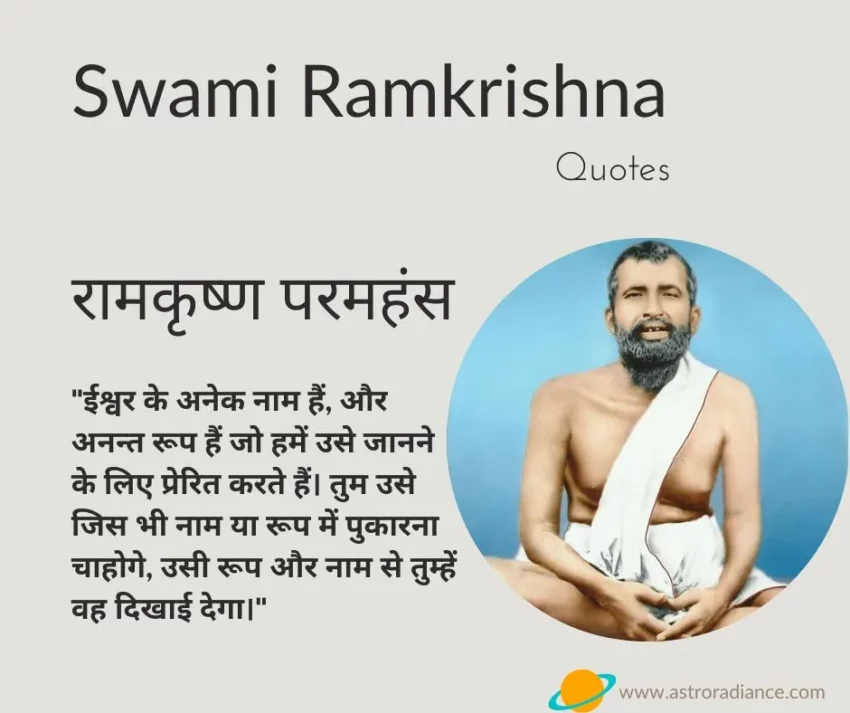Ramakrishna Paramahamsa Quotes
रामकृष्ण परमहंस भारत के एक महान संत, आध्यात्मिक गुरु एवं विचारक थे। यह आधुनिक भारत के सर्वाधिक प्रसिद्ध आध्यात्मिक गुरु स्वामी विवेकानंद के गुरु थे। स्वामी रामकृष्ण परमहंस की कृपा से ही स्वामी विवेकानंद को आत्मज्ञान की प्राप्ति हुई थी।
इन्होंने सभी धर्मों की एकता पर जोर दिया। उन्हें बचपन से ही विश्वास था कि ईश्वर के दर्शन हो सकते हैं।अतः ईश्वर की प्राप्ति के लिए उन्होंने कठोर साधना और भक्ति का जीवन बिताया। स्वामी रामकृष्ण माँ काली के महान भक्त थे तथा कोलकाता स्थित दक्षिणेश्वर मंदिर में पुजारी थे।
साधना के फलस्वरूप वह इस निष्कर्ष पर पहुँचे कि संसार के सभी धर्म सच्चे हैं और उनमें कोई भिन्नता नहीं। वे ईश्वर तक पहुँचने के भिन्न-भिन्न साधन मात्र हैं। इस लेख का उद्देश्य स्वामी रामकृष्ण परमहंस के महान विचारों को जनसाधारण तक पहुँचाना है।
Ramakrishna Paramahamsa Quotes in Hindi|English
“अपने दिमाग में कभी यह न सोचें कि केवल आपका विश्वास ही सच्चा है और बाकी सभी झूठे हैं। यह निश्चय जान लो कि निराकार ईश्वर भी सत्य है और साकार ईश्वर भी सत्य है। फिर जो भी विश्वास तुम्हें आकर्षित करे, उसे दृढ़ता से थामे रहो।” -रामकृष्ण परमहंस
“Never get into your head that your faith alone is true and every other is false. Know for certain that God without form is real and that God with form is also real. Then hold fast to whichever faith appeals to you.”
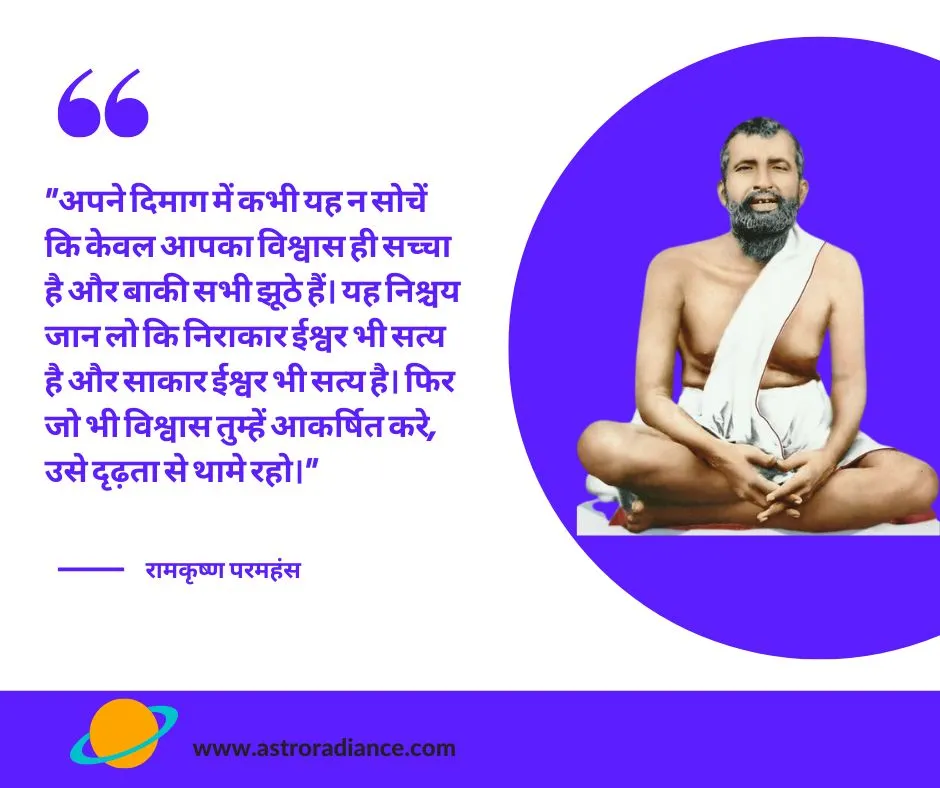
“महिलाएँ, वे सभी, शक्ति की साक्षात् प्रतिमाएँ हैं।” -रामकृष्ण परमहंस
Women are, all of them, the veritable images of Shakti.
“सूरज पूरी दुनिया को गर्मी और रोशनी दे सकता है, लेकिन जब बादल उसकी किरणों को बंद कर देते हैं तो वह ऐसा नहीं कर पाता। उसी प्रकार जब तक हृदय पर अहंकार छाया रहता है, तब तक ईश्वर उस पर प्रकाश नहीं डाल सकता।”
The sun can give heat and light to the whole world, but he cannot do so when the clouds shut out his rays. Similarly as long as egotism veils the heart, God cannot shine upon it.
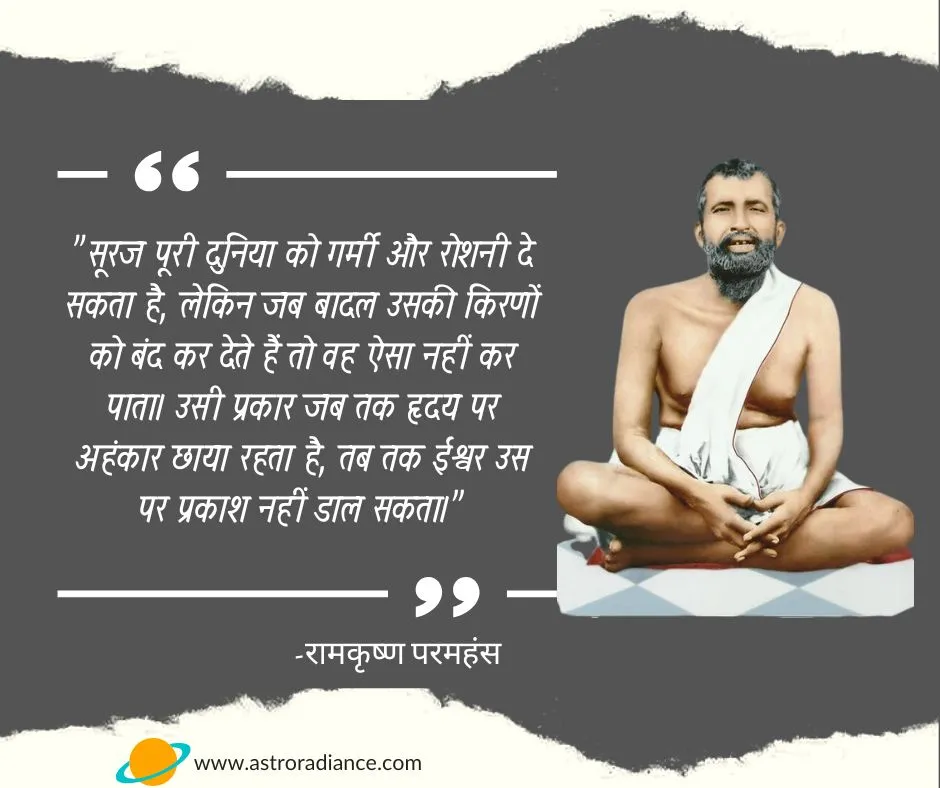
“ज्ञान एकता की ओर ले जाता है, लेकिन अज्ञानता विविधता की ओर ले जाती है।” -रामकृष्ण परमहंस
“Knowledge leads to unity, but Ignorance to diversity.”
“भगवान दो अवसरों पर हँसते हैं। वह हँसता है जब चिकित्सक रोगी की माँ से कहता है, ‘डरो मत, माँ; मैं तुम्हारे लड़के को अवश्य ठीक कर दूँगा।’ भगवान हँसते हुए अपने आप से कहते हैं, ‘मैं उसका प्राण लेने जा रहा हूँ, और यह मनुष्य कहता है कि वह उसे बचाएगा!’ चिकित्सक सोचता है कि वह स्वामी है, यह भूल जाता है कि भगवान ही स्वामी है।
भगवान फिर हँसते हैं जब दो भाई अपनी ज़मीन को एक धागे से बाँटते हैं, और एक दूसरे से कहते हैं, ‘यह तरफ मेरी है और उस तरफ तुम्हारी है।’ वह हंसते हैं और खुद से कहते हैं, ‘पूरा ब्रह्मांड मेरा है, लेकिन वे कहते हैं कि वे इस हिस्से या उस हिस्से के मालिक हैं।”
God laughs on two occasions. He laughs when the physician says to the patient’s mother, ‘Don’t be afraid, mother; I shall certainly cure your boy.’ God laughs, saying to Himself, ‘I am going to take his life, and this man says he will save it!’ The physician thinks he is the master, forgetting that God is the Master. God laughs again when two brothers divide their land with a string, saying to each other, ‘This side is mine and that side is yours.’ He laughs and says to Himself, ‘The whole universe belongs to Me, but they say they own this portion or that portion.’
“ईश्वर के प्रेमी किसी जाति के नहीं होते।” -रामकृष्ण परमहंस
Lovers of God do not belong to any caste.
“नाव पानी में रह सकती है, लेकिन पानी नाव में नहीं रहना चाहिए। एक आध्यात्मिक साधक संसार में रह सकता है, लेकिन संसार उसके भीतर नहीं रहना चाहिए।” -रामकृष्ण परमहंस
A boat may stay in water, but water should not stay in boat. A spiritual aspirant may live in the world, but the world should not live within him.
“ईश्वर के अनेक नाम हैं, और अनन्त रूप हैं जो हमें उसे जानने के लिए प्रेरित करते हैं। तुम उसे जिस भी नाम या रूप में पुकारना चाहोगे, उसी रूप और नाम से तुम्हें वह दिखाई देगा।” -रामकृष्ण परमहंस
Many are the names of God, and infinite the forms that lead us to know Him. In whatsoever name or form you desire to call Him, in that very form and name you will see Him.
“प्रेम तीन प्रकार का होता है; निःस्वार्थ, पारस्परिक और स्वार्थी। निःस्वार्थ प्रेम सर्वोच्च प्रकार का होता है; प्रेमी केवल प्रेमिका के हित के बारे में सोचता है और उसे अपने कष्टों की परवाह नहीं होती। आपसी प्रेम में प्रेमी न केवल अपनी प्रेमिका का सुख चाहता है; लेकिन अपनी ख़ुशी की ओर भी नज़र रखता है. यह मध्यम है. स्वार्थी प्रेम सबसे निम्नतम है। वह केवल अपनी ख़ुशी की ओर देखता है, चाहे उसके प्रिय को दुख हो या दुख।”
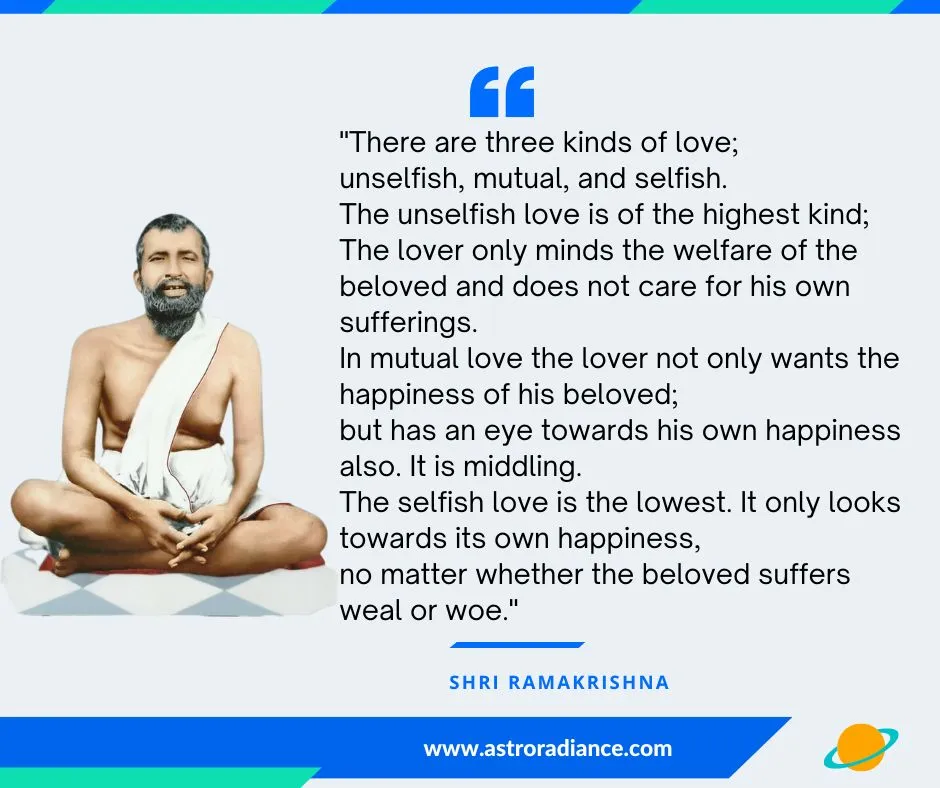
There are three kinds of love; unselfish, mutual, and selfish.
The unselfish love is of the highest kind;
The lover only minds the welfare of the beloved and does not care for his own sufferings.
In mutual love the lover not only wants the happiness of his beloved;
but has an eye towards his own happiness also. It is middling.
The selfish love is the lowest. It only looks towards its own happiness,
no matter whether the beloved suffers weal or woe.
“वर्षा का पानी कभी भी ऊँचे स्थान पर नहीं टिकता, बल्कि नीचे की ओर बह जाता है। इसी प्रकार परमेश्वर की दया भी नम्र लोगों के मन में बनी रहती है, परन्तु निकम्मों और अभिमानियों पर से उतर जाती है।”
Rain-water never stands on high ground, but runs down to the lowest level. So also the mercy of God remains in the hearts of the lowly, but drains off from those of the vain and the proud.
“जैसे आप भगवान से भक्ति के लिए प्रार्थना करते हैं, वैसे ही यह भी प्रार्थना करें कि आप किसी में दोष न निकालें।”
As you pray to God for devotion, so also pray that you may not find fault with anyone.
“निःस्वार्थ कर्म से हृदय में ईश्वर के प्रति प्रेम बढ़ता है। फिर, उनकी कृपा से, समय के साथ व्यक्ति को उसका एहसास हो जाता है। भगवान को देखा जा सकता है, उनसे बात की जा सकती है, जैसे मैं आपसे बात कर रहा हूं।”
“Through selfless work, love of God grows in the heart. Then, through His grace, one realises Him in course of time. God can be seen, one can talk to Him, as I am talking to you.”

“पुरुष तकिये के खोल की तरह होते हैं। एक का रंग लाल, दूसरे का नीला और तीसरे का काला हो सकता है; लेकिन सभी के भीतर एक ही कपास होती है। मनुष्य के साथ भी ऐसा ही है; एक सुन्दर है, दूसरा कुरूप है, तीसरा पवित्र है, और चौथा दुष्ट है; लेकिन ईश्वरीय सत्ता उन सभी में निवास करती है।”
Men are like pillow-cases. The colour of one may be red, that of another blue, and that of the third black; but all contain the same cotton within. So it is with man; one is beautiful, another is ugly, a third holy , and a fourth wicked; but the Divine Being dwells in them all.
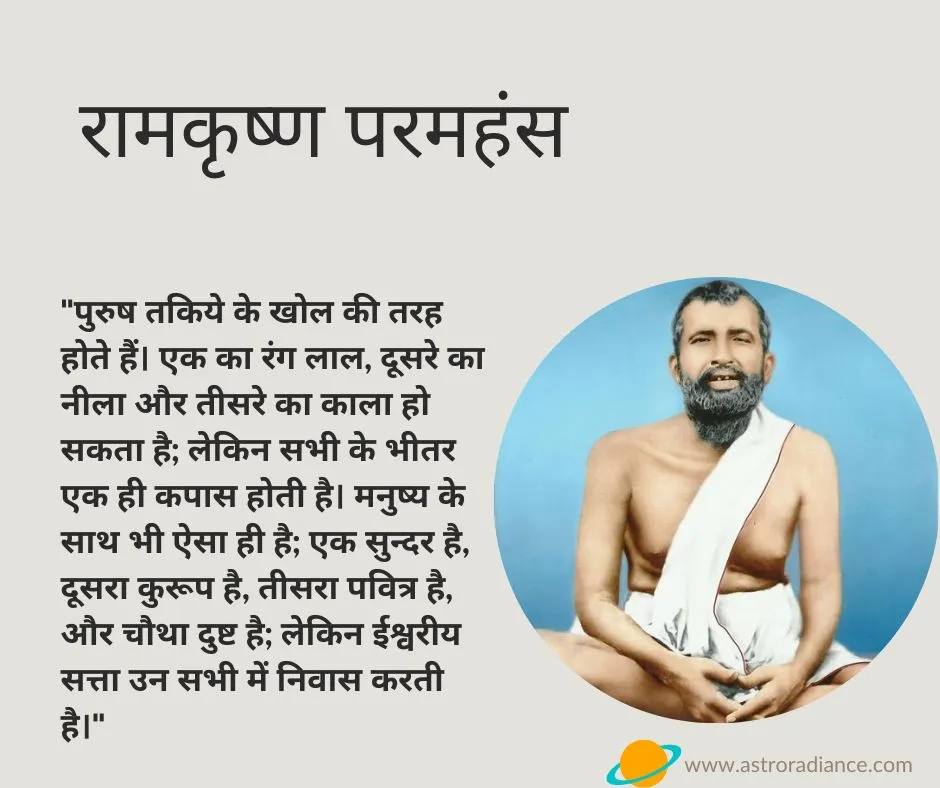
“धर्म पर बात करना आसान है, लेकिन उस पर अमल करना मुश्किल।”
It is easy to talk on religion, but difficult to practise it.
“आध्यात्मिकता स्वतः ही विनम्रता की ओर ले जाती है। जब एक फूल विकसित होकर फल बन जाता है, तो पंखुड़ियाँ अपने आप झड़ जाती हैं। जब कोई आध्यात्मिक हो जाता है, तो अहंकार धीरे-धीरे अपने आप ख़त्म हो जाता है। फलों से लदा पेड़ हमेशा नीचे झुका रहता है। विनम्रता महानता की निशानी है।”
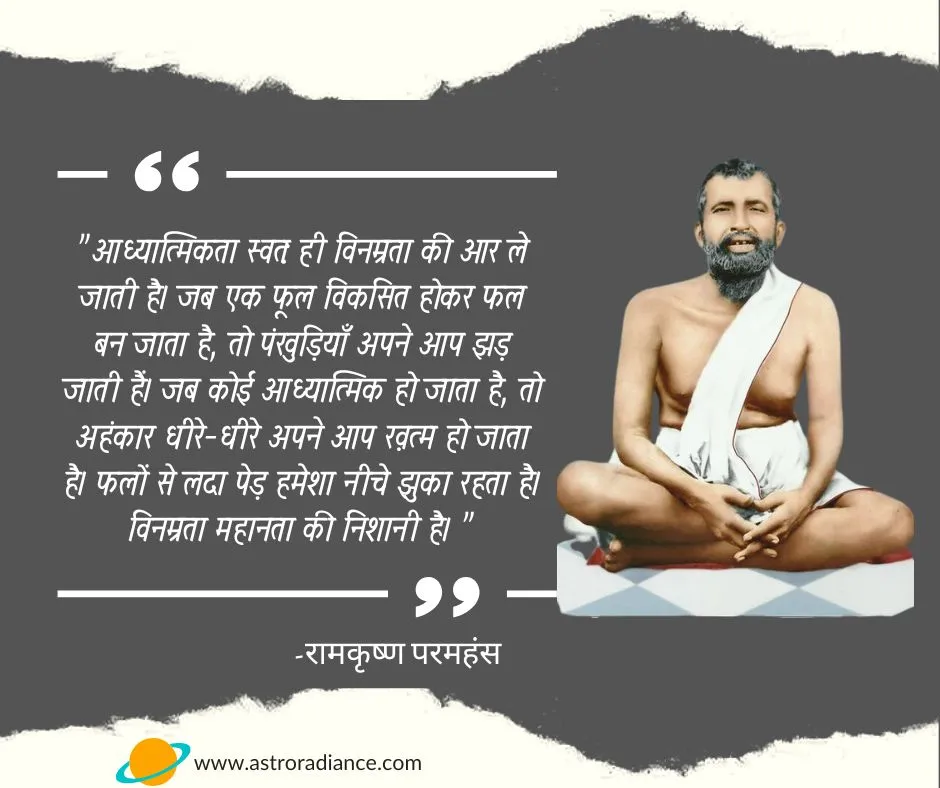
Spirituality automatically leads to humility. When a flower develops into a fruit, the petals drop off on its own. When one becomes spiritual, the ego vanishes gradually on its own. A tree laden with fruits always bends low. Humility is a sign of greatness.
“यदि आप अपने आदर्श पर ध्यान करेंगे तो आप उसका स्वरूप प्राप्त कर लेंगे। यदि तुम दिन-रात ईश्वर का चिंतन करोगे तो तुम्हें ईश्वर का स्वरूप प्राप्त हो जाएगा।”
If you meditate on your ideal, you will acquire its nature. If you think of God day and night, you will acquire the nature of God.
“जब फूल खिलते हैं तो मधुमक्खियाँ बिन बुलाए आ जाती हैं।”
When the flower blooms, the bees come uninvited.
“चीनी और रेत को एक साथ मिलाया जा सकता है, लेकिन चींटी रेत को अस्वीकार कर देती है और चीनी के दाने को लेकर चली जाती है; इसलिए धर्मात्मा लोग बुराई में से अच्छाई को ऊपर उठाते हैं।”
Sugar and sand may be mixed together, but the ant rejects the sand and goes off with the sugar grain; so pious men lift the good from the bad.
“केवल दो प्रकार के लोग ही आत्म-ज्ञान प्राप्त कर सकते हैं: वे जो सीखने से बिल्कुल भी बोझिल नहीं हैं, यानी जिनके दिमाग दूसरों से उधार लिए गए विचारों से भरे हुए नहीं हैं; और जो सभी शास्त्रों और विज्ञानों का अध्ययन करने के बाद यह जान गए हैं कि वे कुछ भी नहीं जानते हैं।”
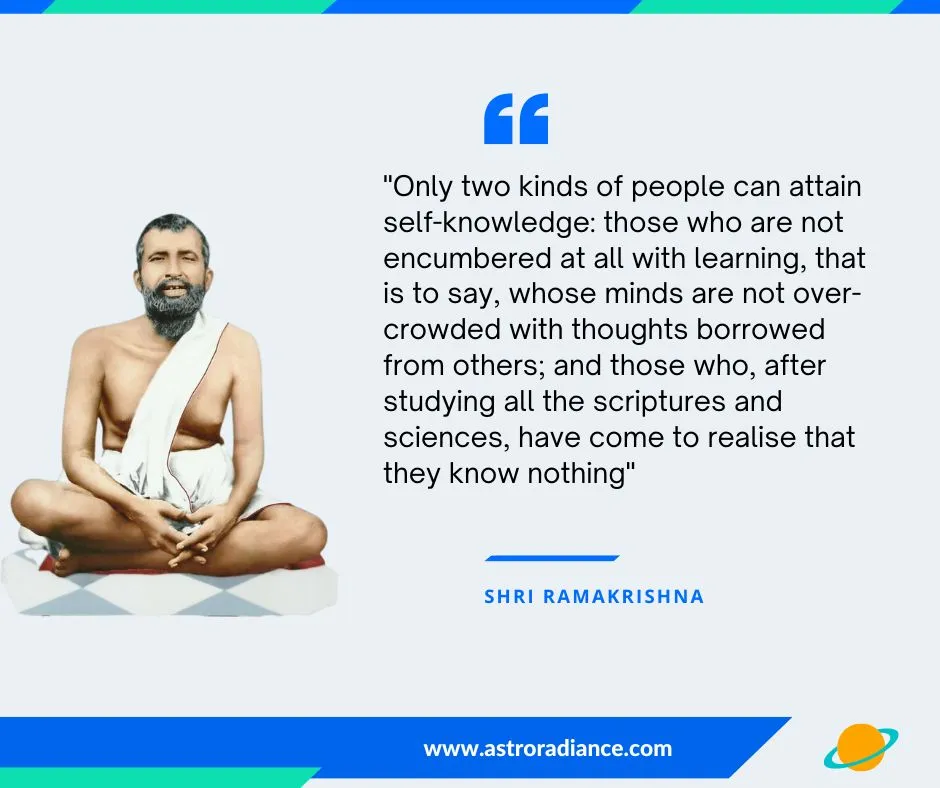
Only two kinds of people can attain self-knowledge: those who are not encumbered at all with learning, that is to say, whose minds are not over-crowded with thoughts borrowed from others; and those who, after studying all the scriptures and sciences, have come to realise that they know nothing.
“अहंकार बरगद के पेड़ की जड़ की तरह है, आप सोचते हैं कि आपने सब कुछ हटा दिया है और एक सुबह आप फिर से एक अंकुर को पनपते हुए देखते हैं।”
The ego is like the root of a banyan tree, you think you have removed it all then one fine morning you see a sprout flourishing again.
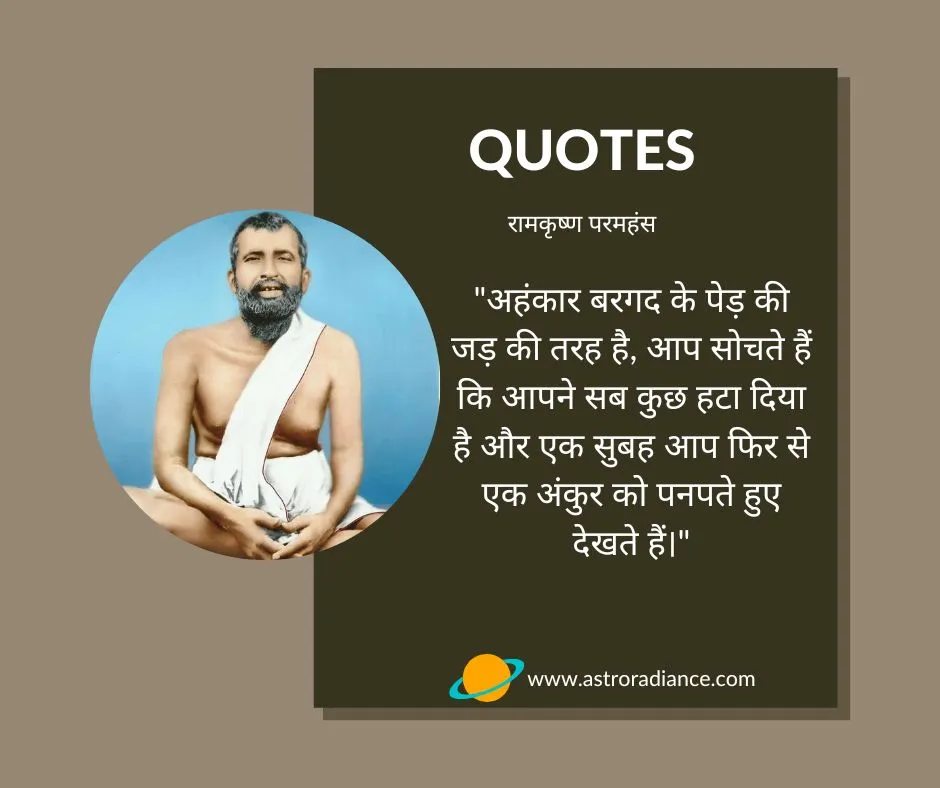
स्वर्ग से आनंद का सागर बरस सकता है, लेकिन यदि आप केवल एक उंगली थामते हैं, तो आपको बस इतना ही प्राप्त होता है।
An ocean of bliss may rain down from the heavens, but if you hold up only a thimble, that is all you receive.
“यह मन ही है जो किसी को बुद्धिमान या अज्ञानी, बाध्य या मुक्त बनाता है।”
It is the mind that makes one wise or ignorant, bound or emancipated.
“जो भक्त गृहस्थ जीवन जीते हुए भगवान को पुकार सकता है, वह वास्तव में नायक है। भगवान सोचते हैं: ‘वह वास्तव में धन्य है जो अपने सांसारिक कर्तव्यों के बीच मुझसे प्रार्थना करता है। वह एक बड़ी बाधा को पार करते हुए, मुझे ढूंढने की कोशिश कर रहा है – मानो एक टन वजनी पत्थर के एक विशाल खंड को दूर धकेल रहा हो। ऐसा व्यक्ति ही असली नायक होता है।”
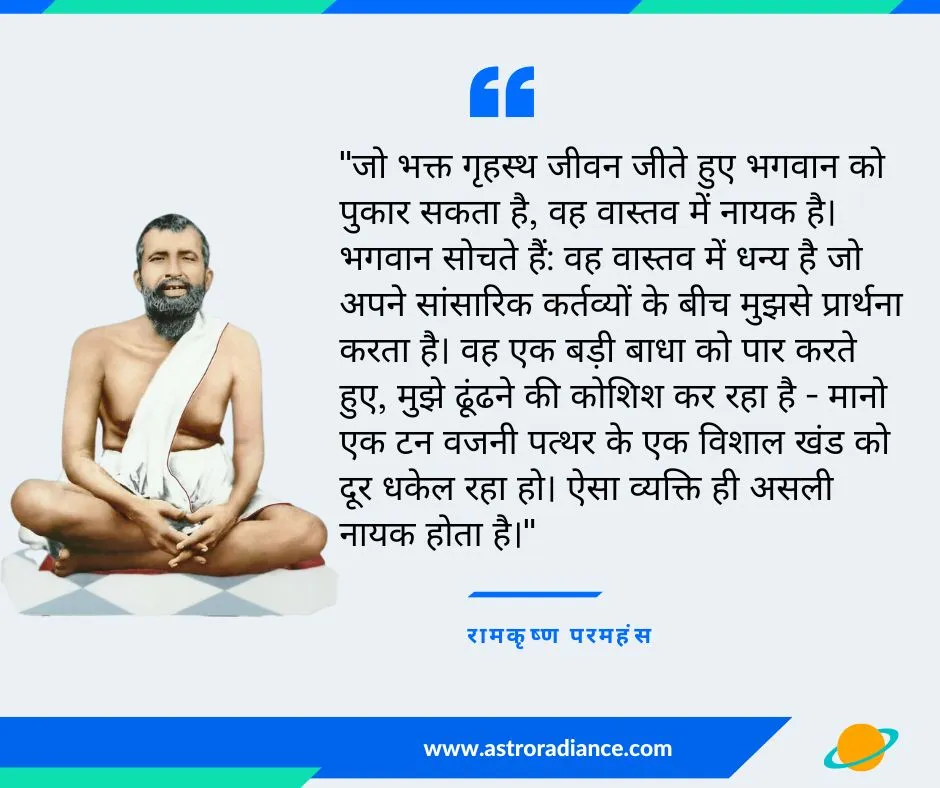
A devotee who can call on God while living a householder’s life is a hero indeed. God thinks: ‘He is blessed indeed who prays to me in the midst of his worldly duties. He is trying to find me, overcoming a great obstacle — pushing away, as it were, a huge block of stone weighing a ton. Such a man is a real hero.
“सभी को निश्चित रूप से ईश्वर का एहसास होगा। सभी को मुक्ति मिलेगी। हो सकता है कि किसी को सुबह, किसी को दोपहर को और किसी को शाम को भोजन मिले; परन्तु कोई भी भोजन के बिना नहीं रहेगा। बिना किसी अपवाद के सभी निश्चित रूप से अपने वास्तविक स्वरूप को जान लेंगे।”
All will surely realize God. All will be liberated. It may be that some get their meal in the morning, some at noon, and some in the evening; but none will go without food. All, without any exception, will certainly know their real Self.
Ramakrishna Paramahamsa Books To Read







